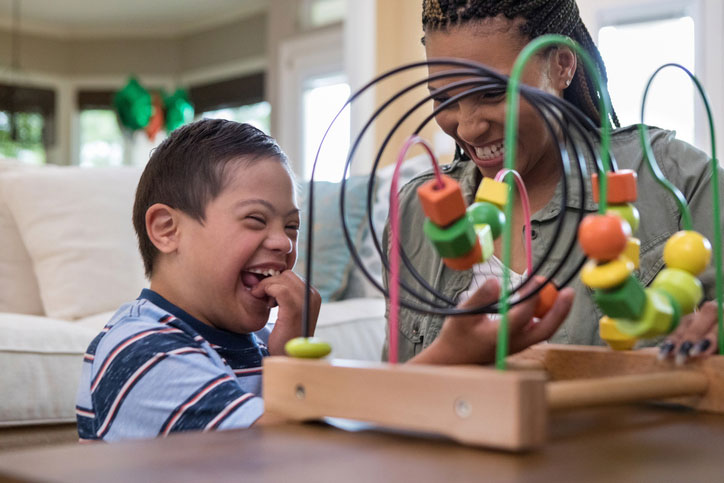Written by Helen Lewis
According to the National Child Abuse and Neglect Data System (NCANDS), child abuse and neglect increased dramatically between 2017 and 2021.
In 2017, there were 7,392 reported incidents of maltreatment of minors, with an incidence rate of 3.2 per 1,000 children. By 2021, that number had shot up to 21,242 victims of child abuse or neglect, or an incidence rate of 9.2 per 1,000. The majority of these children are under one year old.
Social workers have the ability to save the lives of children in a way that protects their psychological and emotional well-being. Working within the child welfare system doesn’t mean separating families: in fact, much of social work in child welfare is devoted to safeguarding the maintenance of cohesive family structures and reducing the impacts of trauma.
The Child Welfare System in North Carolina
The child welfare system in North Carolina operates within a framework designed to safeguard the well-being of children and families. The Department of Health and Human Services, through its Division of Social Services, plays a central role in overseeing child welfare services across the state. The system is structured to address concerns related to child abuse, neglect, and family instability while working collaboratively with various agencies and community partners.
When concerns of child maltreatment arise, individuals or mandated reporters can make reports to the North Carolina Child Protective Services (CPS). CPS is responsible for investigating allegations of abuse or neglect, which is also known as maltreatment.
Every five years, each state is required by the US Department of Health and Human Services to draft a Child and Family Services Plan for the next half-decade.
In its most recent assessment, the North Carolina Department of Health and Human Services (NCDHHS) acknowledged that there is currently a lack of consistent support within the child welfare workforce, which they attributed to factors including workloads, compensation, and access to services.
Similarly, the NCDHHS flagged that many welfare programs do not have access to adequate resources, particularly those that are culturally competent—a cornerstone of social work philosophy. The notion of cultural competence, or cultural sensitivity, weaves together an identification and acknowledgement of one’s own privileges and identities, as well as the identities of the people they are currently serving. This could mean things like providing linguistically accessible materials to people who are disabled or speak limited to no English, or addressing intersecting concerns about homelessness and a child not being enrolled in school.
How A Child Enters the Welfare System
Concerns or allegations of abuse, neglect, and family instability are frequent catalysts for a child to become involved with the public welfare system. Though the specific steps can vary by jurisdiction, the following sketches how the process may play out:
- Report of Concern: The process often begins when someone, known as a mandated reporter (such as teachers, healthcare professionals, or social workers), or any concerned individual, makes a report to the child protective services (CPS) agency. Reports can be made based on observations of potential abuse, neglect, or unsafe living conditions.
- Initial Assessment: Upon receiving a report, CPS assesses the information to determine if there is a reasonable cause to believe that a child is at risk of abuse or neglect. This assessment may involve interviews with the child, family members, and other relevant individuals. The goal is to gather information on the safety of the child and the family’s overall situation
- Investigation: If the initial assessment suggests the need for further inquiry, CPS may initiate a formal investigation. This process involves more in-depth assessments, interviews, and visits to the child’s home to gather evidence and make determinations about the safety and well-being of the child.
- Safety Planning: In situations where immediate removal from the home is deemed necessary to ensure the safety of the child, CPS may work with the family to develop a safety plan. This plan outlines steps the family can take to address safety concerns and may involve temporary placement of the child with relatives or in foster care.
- Legal Proceedings: If safety concerns persist or if a child has been removed from the home, legal proceedings may be initiated. A court may become involved to review the case, make determinations about the child’s placement, and set goals for the family to work towards reunification.
- Family Support Services: Throughout the process, families are often provided with support services to address the underlying issues contributing to the child’s welfare concerns. These services may include counseling, parenting classes, substance abuse treatment, and other interventions aimed at promoting family stability and reunification.
- Permanency Planning: If reunification with the biological family is not possible or safe, the child welfare system may work towards achieving permanency through alternative means, such as adoption or guardianship.
Challenges Faced
Children in the welfare system often face a myriad of challenges that can significantly impact their well-being and development.
One of the primary challenges is the experience of trauma resulting from abuse, neglect, or the separation from their families. The disruption of stable, nurturing relationships can lead to emotional and psychological difficulties. Moreover, the uncertainty and frequent changes in living arrangements, such as moving between foster homes or group facilities, can contribute to feelings of instability and a lack of a consistent support system.
Educational challenges are another common issue for children in the welfare system. Frequent moves may lead to disruptions in schooling, causing academic setbacks and making it difficult for children to establish a sense of continuity in their education. The trauma they have experienced may also manifest in behavioral issues that impact their ability to engage in learning. Children in the welfare system often require additional educational support and services to address any developmental delays or learning disabilities resulting from their early experiences.
The stigma associated with being in the welfare system can contribute to social and emotional challenges. They may face discrimination or negative perceptions from peers, educators, and community members, impacting their self-esteem and sense of belonging. Overcoming societal stereotypes and fostering a supportive environment is crucial for the healthy development of children in the welfare system.
Still, transitioning out of the system poses yet another set of challenges. Older youth aging out of foster care may struggle with the abrupt shift to independence, facing difficulties in finding stable housing, employment, and continuing education. Without proper support and guidance, these individuals are at a higher risk of experiencing homelessness, unemployment, and other adversities.
Addressing the multifaceted challenges faced by children in the welfare system requires a comprehensive and compassionate approach that considers their physical, emotional, and educational needs to ensure a brighter, more stable future.
How MSWs Protect Children
Master of Social Work (MSW) professionals play a critical role in protecting children by employing their expertise in various domains of social work.
One key aspect of work in this field involves conducting assessments of relevant cases to identify risks, protective factors, and a child’s overall well-being.
MSWs utilize their training to evaluate family dynamics, assess potential abuse or neglect, and determine the need for intervention. Through these assessments, they play a crucial role in advocating for the safety and rights of children.
MSWs engage in direct intervention and support by developing and implementing intervention plans aimed at addressing the root causes of family challenges. They work collaboratively with families, helping them access necessary resources and services such as counseling, parenting classes, and substance abuse treatment. MSWs are skilled in navigating complex systems and advocating for the best interests of the child, ensuring that families receive the support they need to provide a safe and nurturing environment.

In cases where immediate removal from the home is necessary, MSWs contribute to the process by facilitating temporary placements, often in foster care, while simultaneously working towards bringing families back together. They actively participate in legal proceedings, presenting comprehensive assessments to the court to inform decisions about the child’s placement and future. MSWs also contribute to the development and implementation of policies and programs aimed at preventing child abuse and improving the overall functioning of the child welfare system.
Additionally, MSWs engage in community outreach and education to raise awareness about child welfare issues, promote preventive measures, and provide support to families before crises escalate. Their commitment to ethical practice, cultural competence, and trauma-informed care ensures that they approach each case with sensitivity and a holistic understanding of the unique needs of children and families.
Spot the Signs: Recognizing Child Abuse
What does child abuse look like? Social workers are primed to look out for certain behaviors and symptoms, such as:
- Age-inappropriate behavior (too young or too old for their age)
- Overly sexualized behavior that is incongruous with a child’s age
- Poor hygiene
- Self-harm
- Bruising or other injuries
- Injuries that are not treated after a parent or caregiver has been notified
- Crying or refusing to go home at the end of a school day
- Underweight; sudden weight loss or gain
- Bullying
- Frequent absences
- Suddenly self-isolation
- Stealing food or begging from classmates
- Appearing depressed or anxious
In addition to these physical cues of abuse and neglect, psychological abuse—a complex, fluid version of maltreatment that can include verbal cruelty and emotional punishment—is also a dangerous form of parental cruelty, which can have lasting emotional and physical impacts.
Social workers are also trained on how to spot potentially abusive or neglectful behaviors in parents. This can include things like:
- Consistently speaking about their children in a way that is excessively hurtful
- Visibly abusing substances
- Excessive, frequent, and extreme doctor’s appointments
- Demonstrates disinterest in child
- When asked about a child’s injury, offers no explanation, contradicting explanations, or an explanation that is not believable
- Does not seek out medical attention for a child’s severe injuries
Strengthening Families
Social workers within the welfare system play a pivotal role in strengthening families in crisis.
Through comprehensive assessments and informed by their training, MSWs gain a nuanced understanding of the unique dynamics within each family, identifying both their strengths and areas of concern. Armed with this insight, social workers are able to develop individualized intervention plans tailored to leverage existing family strengths while effectively addressing specific needs.
One key avenue through which social workers contribute to family strengthening is by providing counseling and support services. These interventions are designed to enhance familial coping mechanisms, improve communication, and foster resilience, ultimately supporting the development of a more stable and supportive family environment.

Stress, such as job loss, early parenthood, or financial insecurity, can often exacerbate a parent’s ability (or lack thereof) to adequately parent or manage their emotions.
In addition to counseling, social workers often engage in parenting education initiatives. These programs equip parents with essential knowledge and skills related to child development, effective discipline, and positive parenting techniques, thereby promoting a healthier family dynamic.
Acting as coordinators, social workers connect families with a comprehensive network of support services, spanning healthcare, housing assistance, and educational resources. By addressing the holistic needs of families, social workers contribute to a family’s overall stability and well-being. Preventive services are also emphasized, with social workers taking proactive measures to identify potential risks and intervene early, aiming to prevent the escalation of challenges and reduce the likelihood of child removal from the home.
Furthermore, social workers play a critical role in advocacy and empowerment within the child welfare system. They champion the rights of families, ensuring that their voices are heard and respected in decision-making processes. This approach empowers families to actively participate in shaping their own destinies, fostering a sense of agency and self-efficacy.
In cases where temporary removal of children from their families has occurred, social workers provide essential support for reunification efforts. Collaborating closely with parents, they address underlying issues and facilitate the reunification process when deemed in the best interest of the child.
How MSW Programs Prepare Social Workers to Work Within Child Welfare
A Master’s in Social Work (MSW) with a focus on the child welfare system prepares professionals to address the complex challenges faced by children and families involved in the child welfare system. This specialized program equips students with the necessary knowledge, skills, and ethical understanding to advocate for the well-being of vulnerable children. Graduates of this program are trained to navigate the intricate web of social services, legal frameworks, and community resources to ensure the best outcomes for children in need.
The curriculum typically covers a range of topics, including child development, family dynamics, trauma-informed care, and relevant legal and policy issues. MSW students specializing in child welfare also gain practical experience through internships and field placements, allowing them to apply classroom learning to real-world situations. This hands-on experience is invaluable for developing the ability to assess and intervene in cases of abuse, neglect, or other challenges that children and families may face.
Furthermore, a Master’s in Social Work with a focus on the child welfare system emphasizes cultural competence and sensitivity, recognizing the diverse backgrounds and needs of the families served. Graduates who have accomplished fieldwork relevant to the child welfare system can graduate ready to collaborate with various stakeholders, such as child protective services, courts, schools, and healthcare professionals, in order to develop comprehensive, tailored interventions. Overall, MSWs play a crucial role in preparing social work professionals to make a meaningful impact on the lives of children and families within the child welfare system, promoting resilience, stability, and positive growth.








